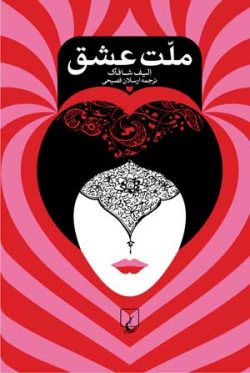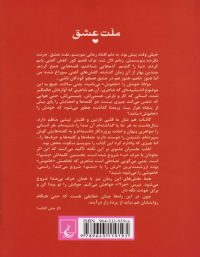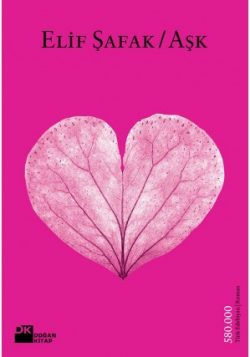In this lyrical, exuberant follow-up to her 2007 novel, The Bastard of Istanbul, acclaimed Turkish author Elif Shafak unfolds two tantalizing parallel narratives- one contemporary and the other set in the thirteenth century, when Rumi encountered his spiritual mentor, the whirling dervish known as Shams of Tabriz-that together incarnate the poet’s timeless message of love.
Ella Rubenstein is forty years old and unhappily married when she takes a job as a reader for a literary agent. Her first assignment is to read and report on Sweet Blasphemy, a novel written by a man named Aziz Zahara. Ella is mesmerized by his tale of Shams’s search for Rumi and the dervish’s role in transforming the successful but unhappy cleric into a committed mystic, passionate poet, and advocate of love. She is also taken with Shams’s lessons, or rules, that offer insight into an ancient philosophy based on the unity of all people and religions, and the presence of love in each and every one of us. As she reads on, she realizes that Rumi’s story mirrors her own and that Zahara-like Shams-has come to set her free.
THE FORTY RULES OF LOVE
ELIF SHAFAK
The 13th century was a turbulent period in Anatolia, rife with religious clashes, political disputes and endless power struggles. In the West, the Crusaders, on their way to Jerusalem, occupied and sacked Constantinople, leading to the partition of the Byzantine Empire. In the East, highly disciplined Mongol armies swiftly expanded under the military genius of Genghis Khan. In between, different Turkish tribes fought among themselves while the Byzantines tried to recover their lost land, wealth and power. It was a time of unprecedented chaos when Christians fought Christians, Christians fought Muslims, and Muslims fought Muslims. Everywhere one turned, there was hostility and anguish, and an intense fear of what might happen next.
In the midst of this chaos lived a distinguished Islamic scholar, known as Jalal Al-Din Rumi. Nicknamed Mawlana -Our Master- by many, he had thousands of disciples and admirers from all over the region and beyond, and was regarded as a beacon to all Muslims.
In 1244, Rumi met Shams – a wandering dervish with unconventional ways and heretical proclamations. Their encounter altered both their lives. At the same time it marked the beginning of a solid, unique friendship that Sufis in the centuries to follow likened to the meeting of two oceans. By meeting this exceptional companion, Rumi was transformed from a mainstream cleric to a committed mystic, passionate poet, advocate of love and originator of the ecstatic dance of the whirling dervishes, daring to break free of all conventional rules.
In an age of deeply-embedded bigotries and clashes, he stood for a universal spirituality, opening his doors to people of all backgrounds. Rumi stood up for an inner-oriented jihad where the aim was to struggle against and ultimately prevail over one’s ego, nafs.
Not everyone welcomed these ideas, however, just as not everyone opens their hearts to love. The powerful spiritual bond between Shams and Rumi became the target of rumor, slander and attack. They were misunderstood, envied, vilified, and ultimately betrayed by those closest to them. Three years after they met, they were tragically separated.
But the story didn’t end there.
In truth, there never was an end. Almost eight hundred years later the spirits of Shams and Rumi are still alive today, whirling amid us somewhere…
About Author:
Elif Shafak is an award-winning British-Turkish novelist. She writes in both Turkish and English, and has published 19 books,12 of which are novels. Her work has been translated into 55 languages. Her latest novel 10 Minutes 38 Seconds in This Strange World was shortlisted for the Booker Prize and RSL Ondaatje Prize; and chosen Blackwell’s Book of the Year. Her previous novel, The Forty Rules of Love was chosen by BBC among 100 Novels that Shaped Our World. Shafak has been conferred Doctor of Humane Letters by Bard College in 2021. Shafak holds a PhD in political science, and she has taught at various universities in Turkey, the US and the UK, including St Anne’s College, Oxford University, where she is an honorary fellow.
Added Date: 27/12/2019 8:58:37 PM
Last update: 18/02/2023 6:35:53 PM
پرفروشترین رمان تاریخ ترکیه که گفته میشود بیش از پانصد بار تجدید چاپ شده است. این رمان به نوعی بازگویی رابطه میان شمس و مولانا در قالب داستانی امروزی و از زبان یک زن آمریکایی است که به همه روزمرگی ها و همسر و کار پشت پا میزند و عازم سفر ترکیه می شود.
اما پرفروشترین رمان تاریخ ترکیه چگونه کتابی ست؟ رمان «ملت عشق» اثریست عاشقانه؛ برخوردار از فرمی که می توان آن را دو رمان محسوب کرد در قالب یک رمان؛ دو روایت تودرتو که به صورت موازی روایت می شوند؛ اما در دو زمان مختلف جریان دارند. یکی قرنها پیش در شرق و یکی در زمان حال و در غرب (امریکا) بر این پایه اگرچه به ظاهر تفاوت های بسیار زیاد و اساسی باهم دارند اما از آنجا که بنمایه هردوی آنها عشق و تاثیر آن در زندگیست بی شباهت به هم نیستند. ملت عشق از یک سو داستان دلدادگی و از دیگر سو داستان رهایی است؛ از یک سو به عشق زمینی می پردازد و از دیگر سو به عشق معنوی و جنبه های عرفانی عشق و زندگی اشاره میکند. این سویه های متقابل که در هر دو خط داستان دیده می شود از جمله جذابیت های اصلی این رمان محسوب می شود که الیف شافاک با چیره دستی با کنارهم قرار دادن این عناصر خط و ربطی برای نزدیک شدن و پیوند خوردن این دو داستان به وجود آورده است.
ناگفته نماند که ترجمه ارسلان فصیحی هم کاری بدون نقص است تا جایی که کاوه میرعباسی، نویسنده و مترجم معروف درباره آن می گوید: “من همیشه کتابهای اصلی را از زبانهای انگلیسی، فرانسوی و اسپانیایی میخوانم، اما مدتی قبل، «ملت عشق» را با ترجمه ارسلان فصیحی خواندم و از آن بسیار لذت بردم.”
نکتهی دیگر اینکه ترجمه این رمان پنج سال پیش به اتمام رسیده بود که تا چندی پیش جزو آثار غیرقابل انتشار وزارت ارشاد بود اما سرانجام پس از بازبینی مجدد، نشر ققنوس آن را منتشر کرد.
در بخشی از کتاب می خوانیم:
کلماتی که ما برای توصیف خالق بکار میبریم، درواقع نشاندهده ی آنست که ما خودمان را چگونه توصیف میکنیم. اگر موجودی هولناک در ذهنمان متصور میشویم، در واقع این ما هستیم که با ترس احاطه شده ایم. اما اگر عشق و محبت را احساس کردی، از تو چیزی جز این دو پدید نخواهد آمد.
درباره نویسنده:
الیف شافاک یا الیف شفق، زاده ی ۲۵ اکتبر ۱۹۷۱ استراسبورگ فرانسه) نویسنده ای ترک تبار است. او از دانشگاه تکنیک اورتا دو غوی آنکارا لیسانس روابط بین الملل و فوق لیسانس مطالعات زنان و دکترای علوم سیاسی گرفت. او در هنگام تحصیل در دوره ی فوق لیسانس، اولین کتاب داستانش را در سال ۱۹۹۴ و در سال ۱۹۹۷ هم رمان دومش را منتشر کرد. پس از اتمام دوره ی دکترا به استانبول آمد و آینه های شهر را نوشت. شافاک در سال های ۲۰۰۴–۲۰۰۳ با درجه استادیاری در دانشگاه میشیگان و بعد در بخش مطالعات خاور نزدیک دانشگاه آریزونا مشغول به کار شد و از ۲۰۰۵ تا ۲۰۰۹ نیز ستون نویس روزنامه ی زمان بود.شافاک دو رمان به انگلیسی نوشته است که به خاطر اشاره به نسل کشی ارمنیان در رمان دومش به نام حرام زاده ی استانبول، از سوی دادگاه های ترکیه به جرم «اهانت به ترک بودن» متهم شد. پرونده ی او در ژوئن ۲۰۰۶ بسته شد ولی در ژوئیه ی همان سال دوباره گشوده شد و وی با احتمال سه سال زندان روبرو شد. مترجم و ناشر او هم با همین تعداد سال حبس روبرو شدند. در ۲۱ سپتامبر ۲۰۰۶ بخاطر کمبود مدرک، پرونده ی او از نو بسته شد.





























